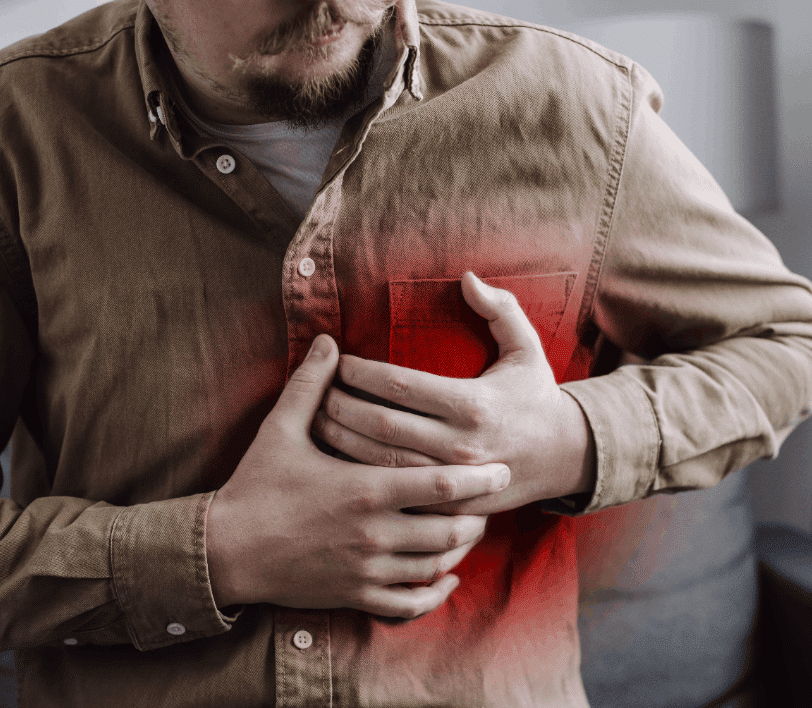heart valve
Lorem ipsum dolor sit amet, consectetur adipiscing elit.

The human heart has 4 valves (2 on each side) that help regulate blood flow in a forward direction. While there are several conditions that affect the valves the most common is failure due to wearing out from age. This situation usually begins at age 50 but generally valve disease progresses very slowly, usually over decades. Valves usually degenerate in one of 2 ways, either the valve leaflets become ripped and dog-eared and the valve leaks blood backward or the valve becomes ripped and the body’s repair process causes the vale to become thickened, like callouses on someones palm. The thickened valve becomes narrowed and wont let blood pass forward. Both processes make the heart less efficient at moving blood forward and increase the work that the heart must do.This commonly results in symptoms of shortness of breath and swelling of the feet and ankles due to the blood flowing backwards. Because the problem is mechanical in nature, medication is usually not helpful. Valve replacement is usually the proper course of action. Traditional open heart surgeryto treat valves is being slowly replaced by newer techniques where the valves can be replaced or repaired through a catheter in the leg. These catheter-basedtechniques have a number of advantages, not the least of which is an overnight hospital stay and a rapid return to normal function. Our doctors are some of the most skilled in the Atlanta area with these techniques. Of course ANY artificial valve is much easier to get infected than a native valve, therefore ALL patients with artificial valve need to be considered for antibiotics prior to certain dental, colon or bladder
Our board-certified heart specialists and our heart care team members will teach you about the types of heart valve disease, including those caused by congenital issues or other problems. We know how to find the underlying issues causing your symptoms and offer experience caring for thousands of heart patients. Our cardiologists will prescribe an effective treatment program and monitor your progress.
As a patient at CVG, you’ll have access to all of the tests, treatments, medications, and surgical procedures that can prevent further damage, lessen symptoms, and repair or replace valves. Please continue reading the additional details on this page. For further information, we encourage you to view our page on heart structure tests, which help us diagnose heart valve disease.
Heart Valve Disease Can Lead To Heart Failure
Heart valve disease occurs when one or more of the valves in your heart is unable to work properly, resulting in an inability for your heart to pump enough blood in the proper direction.
Types Of Heart Valve Disease
Valvular Stenosis
This form occurs when a valve cannot fully open due to stiff or fused leaflets. The opening becomes narrow, making it difficult for the heart to pump blood, meaning it has to work much harder to help your body receive adequate blood. All four valves can develop stenosis; these conditions are referred to as tricuspid stenosis, pulmonic stenosis, mitral stenosis, and aortic stenosis.
Valvular Insufficiency
This is also called regurgitation, incompetence, or a “leaky valve.” This situation occurs when age results in “wear” on the valve leaflets making them unable to close tightly. Since the valves can’t seal properly, blood will begin to leak backward across the valve. As the leaky valve worsens, the heart must work harder to pump blood sufficiently, and less blood will flow into the rest of the body.

Risk Factors For Heart Valve Disease
The major source of valve disease is age, although infections in the blood can scar or distort the valves. This condition is called rheumatic heart disease or sometimes rheumatic fever. Years of uncontrolled blood pressure can injure the valves. Congenital heart defects are rare cause of heart valve disease.
Heart valve disease can lead to blood clots, arrhythmias, stroke, heart failure, and even death.
Causes Of Heart Valve Disease
Heart valve disease is caused when one or more of the four heart valves—the mitral, tricuspid, pulmonary, and aortic valves—fail to open or close properly, disrupting blood flow to the heart. Each valve has flaps or leaflets that are supposed to open and close once per heartbeat, and if this pattern gets disturbed, it can create symptoms and ultimately lead to the need for valve replacement. many side effects.
Congenital Valve Disease
This form of valve disease is present from birth may affect any valve. and typically affects the aortic or pulmonic valves. Valves may have been formed with the wrong size, have malformed leaflets, or have leaflets that are attached incorrectly.
Bicuspid Aortic Valve Disease
This is a form of congenital valve disease that affects the aortic valve, causing it to have only two leaflets instead of the regular number, which is three. Because of the absence of the third leaflet, the bicuspid aortic valve may be stiff or leaky, causing it to malfunction.
Rheumatic Fever
This is caused by an untreated bacterial infectionin the blood stream, most commonly due to a strep throat. The disease usually occurs in children and causes inflammation of the heart valves, although valve damage is not typically seen until decades later. With prompt treatment through antibiotics, valve involvement has become much less common.
Endocarditis
This occurs when bacteria enter the bloodstream and attack the heart valves, resulting in growths, holes, and scarring, which can lead to leaky valves. Bacteria that cause endocarditis can enter the bloodstream due to dental procedures, surgery, IV drug use, or severe infections.
Mitral Valve Prolapse
This condition affects <2% of the population and causes the mitral valve’s leaflets to flop back into the left atrium when your heart contracts. This condition also causes valve tissue to become abnormal and stretchy, leading to leakage.
Other Conditions
Heart attacks and congestive heart failure, can also cause the heart’s shape to distort which results in valve leakage disease. Other causes of valve disease include syphilis, high blood pressure, aortic aneurysms, connective tissue diseases, tumors, drugs, and radiation.
Diagnosing Heart Valve Disease
Your doctor can diagnose heart valve disease by conducting a physical exam, where they start by listening to your heart for heart murmurs, Your doctor will also listen to your lungs to discover if you are retaining any fluid, which is a sign that the heart is not pumping efficiently.
After the physical exam, your doctor may conduct other tests as well, such as an echocardiogram or cardiac catheterization.
Treatment For Heart Valve Disease
Treatment for heart valve disease depends on the type and severity of heart valve disease. The three goals of treatment are to prevent further damage, lessen symptoms, and repair or replace valves. This can be done with medications and surgeries that treat symptoms and decrease the chances of further damage.
Surgeries can be performed to cut away scar tissue reshape malfunctioning leaflets Your heart valves may also be replaced with mechanical valves, or a valve from an animal
Symptoms Of Heart Valve Disease
do occur, they include heart murmurs, chest pain, abdominal swelling, heart palpitations, fatigue, and feeling short of breath. Other symptoms can include swelling in your ankles and feet and rapid weight gain.
As heart valve disease can often lead to heart failure, you may experience symptoms of heart failure as well.
Why Choose CVG?
Trust is the most important thing in the doctor-patient relationship. Our cardiologists’ years of experience and skill will give you peace of mind during tests, diagnosis, and treatment. The latest technology and doctors who care about you make CVG a great choice for heart care. You can be sure that any CVG location in the Atlanta area will provide you with convenient, complete cardiac care.
Related Conditions:
Top Conditions:
Call to Schedule an Appointment
Board-certified Doctors
CVG’s twenty board-certified heart doctors will guide you through your healthcare journey with the utmost compassion and individual attention. We aim to provide you with state-of-the-art cardiac care that includes the full spectrum of services, from testing to diagnosis and treatment. The doctor/patient relationship is built on trust. Through our combined efforts, we can conquer any challenge that comes our way.
How CVG Can Help
CVG offers a variety of services that can check for heart conditions that may be causing your legs to swell. At CVG, we perform stress tests that will observe blood flow and test for Atrial Fibrillation. There are three types of stress tests that we perform:
A treadmill test is a test in which you will walk on a treadmill that gets faster and steeper every 3 minutes. This will stress your heart so that our nurse or doctor can determine your EKG and blood pressure.
An echo test is performed before and after your treadmill test to determine how well your heart pumps blood.
A nuclear stress test is a treadmill test that is prefaced by an injection of medicine that shows the flow of blood to your heart.
We also offer cardiac catheterization, in which a catheter is inserted into the heart in order to take pictures and conduct tests. This procedure allows doctors to gain more information about your condition and suggest treatment options.
If these tests determine a problem, we offer treatment solutions to fix several conditions. Learn more about our services here, or schedule an appointment to talk to our doctors.
Schedule Your Appointment with a CVG Atlanta Area Cardiologist
Atlanta Area Cardiologist
Expertise, experience, and compassion are the pillars of CVG’s patient-centered cardiac care. Please schedule your appointment with CVG today. Call (770) 962-0399 or 678-582-8586. You may also request an appointment online. If you have an emergency, don’t contact us online; please call 911.
Loactions That Treat Arrhythmias

Office Suwanee
1120 Peachtree Industrial Boulevard Suite 208 & 209 Suwanee, Georgia
- 7706379247
- 7702908084





